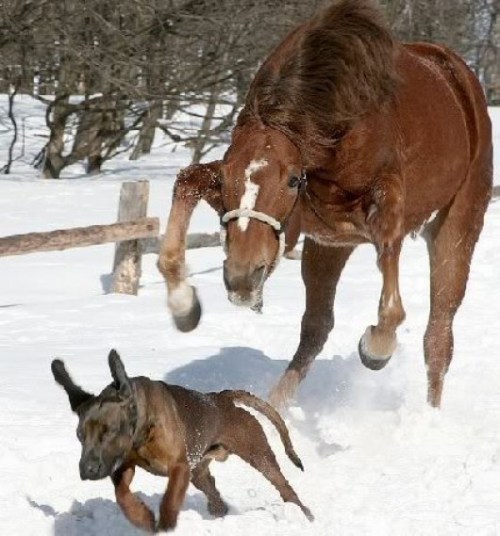 In the pet world, one of the most terrifying words we can hear is “rabies.”
With dogs or cats, it’s about as tragic as can be, but we don’t typically think of horses as even being
capable of carrying the disease. This is an unfortunate oversight though as horses are known to catch
rabies just as a dog or a cat. And worse, there’s no scientific way to conclusively diagnose rabies on a
live pet, so the only way to know for sure is to do an autopsy. But there’s still some signs that point
toward the disease, so be on the lookout for these things.
In the pet world, one of the most terrifying words we can hear is “rabies.”
With dogs or cats, it’s about as tragic as can be, but we don’t typically think of horses as even being
capable of carrying the disease. This is an unfortunate oversight though as horses are known to catch
rabies just as a dog or a cat. And worse, there’s no scientific way to conclusively diagnose rabies on a
live pet, so the only way to know for sure is to do an autopsy. But there’s still some signs that point
toward the disease, so be on the lookout for these things.
Probably the saddest part of rabies is that there is no known cure or
treatment for an animal that’s been infected by the virus. Humans can be treated, but horses are out of luck
and out of options short of praying. Usually when bitten, the virus will start to multiply at the original
entry to the body, then spread to the nervous system and attack the brain. A horse can carry the virus around
for weeks at a time without showing any signs, though typically the average is 12 days from contraction to
death. However, the average from visual signs to the death is a staggeringly low 5 days.
The earliest and most effective symptom you can observe is a general muzzle
twitching. It’s usually fairly subtle, but it’s the most common signal that something’s really wrong. You’ll
also probably notice a lot of weakness and sleepiness as their nervous system is attacked, leaving them without
their usual energy and the ability to control themselves as well. Eventually swallowing will become a challenge
and paralysis could take over.
One of the other biggest indicators is the usual cliché for rabies: excess
saliva, causing the mouth to foam. While horses won’t necessarily start foaming to the point that dogs would,
they will still start to drool excessively to the point that it becomes obvious. This combined with the an
increase in aggression, most often resulting in said saliva being tossed about, is a dead giveaway.
While there’s not much that can be done once your horse has succumb to the
disease, there are a few things you can do to try and prevent it entirely. The first and most important is to
get yearly vaccinations for your horse. There should be no excuse to forget or neglect these regular shots as
they are vital to your horse’s health. Giving them dietary supplements can help a little bit as well since a
stronger horse is a safer horse, but the best defense is still the vaccination route.
A horse with rabies is never an enjoyable experience. Too often you’ll
discover the symptoms and have a vet confirm what you fear, resulting in euthanasia as soon as possible as
there’s nothing else that can be done. Don’t let this happen to your horse if you can at all prevent it. Get
them vaccinated, keep them away from suspicious animals, and keep them strong. Here’s hoping that they live a
long and healthy life!
Related Articles
Breaking a Leg- What It Means For Your Horse
Deadly Equine Diseases
Tips for Keeping Flies Under
Control
Horse Inspection Checklist
Five Most Common Horse Diseases
How to Spot a Malnourished Horse
Top 10 Most Poisonous Plants for Horses
Feeding and Rebuilding a Malnourished Horse
Helping a Horse Living with Cushing's
How to Treat Abscesses on Your Horse
Colic and Your Horse
Confirming That Your Horse Has Rabies
Helping a Pregnant Mare
Handling a Rattlesnake Bite to Your Horse
Being Aware of Tetanus and Your Horse
Preventing Thrush in Your Horse